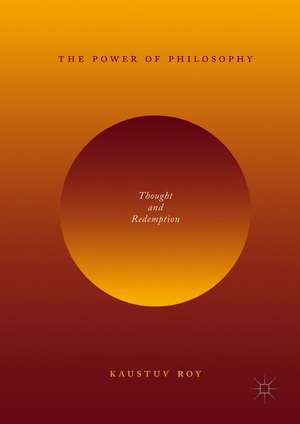The Power of Philosophy: Thought and Redemption
Autor Kaustuv Royen Limba Engleză Hardback – 25 aug 2018
| Toate formatele și edițiile | Preț | Express |
|---|---|---|
| Paperback (1) | 369.13 lei 38-44 zile | |
| Springer International Publishing – 28 dec 2018 | 369.13 lei 38-44 zile | |
| Hardback (1) | 476.54 lei 38-44 zile | |
| Springer International Publishing – 25 aug 2018 | 476.54 lei 38-44 zile |
Preț: 476.54 lei
Preț vechi: 517.98 lei
-8% Nou
Puncte Express: 715
Preț estimativ în valută:
91.20€ • 94.86$ • 75.29£
91.20€ • 94.86$ • 75.29£
Carte tipărită la comandă
Livrare economică 11-17 aprilie
Preluare comenzi: 021 569.72.76
Specificații
ISBN-13: 9783319969107
ISBN-10: 3319969102
Pagini: 235
Ilustrații: XI, 235 p.
Dimensiuni: 148 x 210 mm
Greutate: 0.45 kg
Ediția:1st ed. 2018
Editura: Springer International Publishing
Colecția Palgrave Macmillan
Locul publicării:Cham, Switzerland
ISBN-10: 3319969102
Pagini: 235
Ilustrații: XI, 235 p.
Dimensiuni: 148 x 210 mm
Greutate: 0.45 kg
Ediția:1st ed. 2018
Editura: Springer International Publishing
Colecția Palgrave Macmillan
Locul publicării:Cham, Switzerland
Cuprins
1. Introduction: Toward Philosophical Bilingualism.- 2. Heidegger and the Pathless Land.- 3. Schelling’s Great Leap.- 4. Goethe and Delicate Empiricism.- 5. Among the “Pre-Socratics”: Heraclitus.- 6. Philosophical Praxis.- 7. Beyond the Inner Daguerreotype.- 8. Epilogue.
Notă biografică
Kaustuv Roy is Professor of Philosophy and Sociology at Azim Premji University, Bangalore, India. His recent work includes Limits of the Secular, published by Palgrave Macmillan in 2017.
Textul de pe ultima copertă
This book explores the possibility of philosophical praxis by weaving an ontological thread through four principal thinkers: Heidegger, Schelling, Goethe, and Heraclitus. It argues that a special kind of redemptive power awaits the structural understanding of thought that is beyond semantic formations such as concepts and ideational systems. The author claims that the “power” is negative in nature, trans-personal, and derived directly from the understanding of thought as a structural pulse. The book travels backwards in time, encountering successively Heidegger’s critique of calculative thinking, Schelling’s Mind/Nature relation, Goethe’s Delicate Empiricism, and the aphoristic wisdom of Heraclitus in search of a redemptive power that lies in the self-knowledge of thought. This power is ontological and not historical or developmental; it is the same at all times and all points of history. The author refers to the praxis as “philosophical bilingualism.”
Caracteristici
Argues that a special kind of redemptive power awaits the ontological (structural) understanding of thought Explores four principle thinkers: Heidegger, Schelling, Goethe, and Heraclitus Suggests that power is not in the “overcoming” of finite determinations but lies in grasping the material process of their formation
